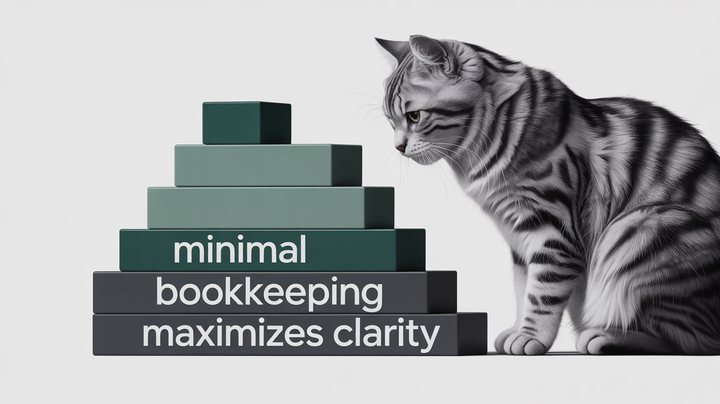What are the minimal bookkeeping practices that maximize financial clarity?
The minimal bookkeeping practices that maximize financial clarity are: weekly transaction reviews, clear expense categorization, monthly profit tracking, and automated reporting dashboards.

Minimal Bookkeeping Practices That Maximize Financial Clarity
The minimal bookkeeping practices that maximize financial clarity are: weekly transaction reviews, clear expense categorization, monthly profit tracking, and automated reporting dashboards. These four pillars create a sustainable system that takes less than 90 minutes per week while providing complete visibility into your business finances.
Frequently Asked Questions
What are the key minimal bookkeeping practices that enhance financial clarity?
The key minimal bookkeeping practices include weekly transaction reviews, clear expense categorization, monthly profit tracking, and automated reporting dashboards. These practices form a sustainable system that ensures visibility into your business finances with less than 90 minutes of effort per week.
How does the 80/20 rule apply to bookkeeping?
In bookkeeping, the 80/20 rule suggests that 20 percent of bookkeeping activities provide 80 percent of financial insights. Focusing on these high-impact activities such as key financial reviews and categorizations maximizes efficiency and clarity, reducing unnecessary complexity.
What is the Monthly Money Date in financial tracking?
The Monthly Money Date is a ritual where you set aside 30 minutes to calculate your business's profit for the month and celebrate progress. This practice helps to build a positive relationship with your finances and provides a consistent review that enhances financial clarity.
How can technology simplify bookkeeping?
Technology simplifies bookkeeping by automating the generation of financial dashboards, which display key metrics like monthly revenue, expenses by category, profit margin, and cash balance in real-time. These tools reduce manual work and provide instant financial insights.
The Foundation: Why Minimal Bookkeeping Works Better
Less Complexity, More Clarity
Traditional bookkeeping often overwhelms solopreneurs with unnecessary detail. The truth is, you don't need complex accounting systems to understand your business finances. What you need is consistent attention to the right metrics.
Inside Journey, we use the Sovereign Three™ framework to help solopreneurs build these minimal systems without the overwhelm that typically comes with financial management.
The 80/20 Rule of Financial Clarity
Just as in other areas of business, the 80/20 rule applies to bookkeeping: twenty percent of activities provide eighty percent of your financial insight. By focusing only on high-impact practices, you create space for what matters most—serving your clients and growing your business.
Core Practice #1: Weekly Transaction Review (15 Minutes)
The Simple Weekly Sweep
Every week, dedicate just 15 minutes to reviewing your business transactions. This isn't about perfection—it's about maintaining awareness of money flowing in and out.
The key is consistency, not complexity. Inside Journey, members receive a gentle weekly reminder and a simple checklist that makes this practice feel supportive rather than overwhelming.
What to Look For
During your weekly sweep, you're simply checking that all transactions are accounted for and noting anything unusual. This regular touch point prevents the dreaded month-end scramble and keeps you connected to your financial reality.
Core Practice #2: Clear Expense Categories (5 Categories Maximum)
The Power of Simplicity
Most solopreneurs overcomplicate their expense tracking. You need only 3–5 clear categories to understand where your money goes. Common examples include: Operations, Marketing, Professional Development, and Client Services.
This simplified approach aligns perfectly with the "Know Your Numbers" pillar of the Sovereign Three™ framework that Journey members use to gain visibility without shame.
Creating Categories That Serve You
Your categories should reflect how you think about your business, not what an accountant might recommend. When categories match your mental model, tracking becomes intuitive rather than forced.
Core Practice #3: Monthly Profit Tracking (30 Minutes)
Beyond Revenue: Understanding Real Profit
Many solopreneurs track revenue but ignore profit. A simple monthly calculation of revenue minus expenses gives you the single most important number in your business.
Journey provides templates and guidance for this monthly check-in, helping members move beyond surface numbers to understand their true financial health.
The Monthly Money Date
Transform profit tracking from a chore into a ritual. Set aside 30 minutes each month for a "money date" where you calculate profit and celebrate your progress. This practice builds a positive relationship with your finances.
Core Practice #4: Automated Financial Dashboards
Let Technology Do the Heavy Lifting
Modern bookkeeping tools can automatically generate visual dashboards showing your key metrics. Once set up, these dashboards update in real-time, giving you instant clarity without manual work.
The Journey community shares recommendations for the simplest, most effective dashboard tools, ensuring you choose technology that supports rather than complicates your system.
Choosing What to Track
Your dashboard should show only what matters: monthly revenue, expenses by category, profit margin, and cash balance. Anything more creates noise that obscures clarity.
Implementation: Making It Sustainable
Start With One Practice
Don't try to implement all four practices at once. Choose the one that feels most approachable and master it before adding another. This gentle approach prevents overwhelm and builds lasting habits.
This philosophy of gradual, sustainable implementation is core to how Journey supports members—you're never behind, you're just ready to begin in a new way.
Creating Your Personal Rhythm
These practices work best when integrated into your natural workflow. Some people prefer Monday morning financial reviews; others choose Friday afternoons. The key is finding what feels sustainable for you.
Inside Journey, the "Claim Your Rhythm" pillar helps you design financial practices that match your energy patterns, not someone else's schedule.
When Minimal Isn't Enough
Recognizing Growth Moments
As your business grows, you may need additional practices. The beauty of starting minimal is that you'll clearly see when more is needed, rather than carrying unnecessary complexity from the start.
Getting Support Without Overwhelm
If you're ready to implement these practices but want guidance and community support, that's exactly what Journey provides—a nonjudgmental space to build financial clarity at your own pace.
Your Next Step
Choose one practice from this guide and commit to it for the next two weeks. Notice how even this small step creates more peace and clarity in your business.
Remember: financial clarity isn't about perfection. It's about consistent, gentle attention to the numbers that matter most. With these minimal practices, you'll spend less time on bookkeeping while gaining more insight than ever before.
If you'd like support implementing these practices within a warm, understanding community, Journey was built for exactly this kind of work—helping conscious solopreneurs create financial systems that feel as good as they function.



